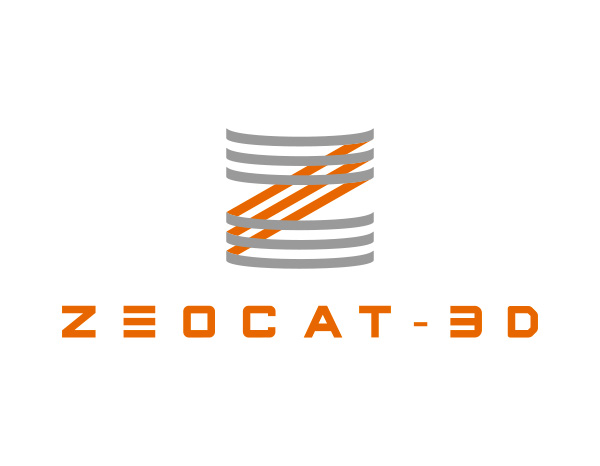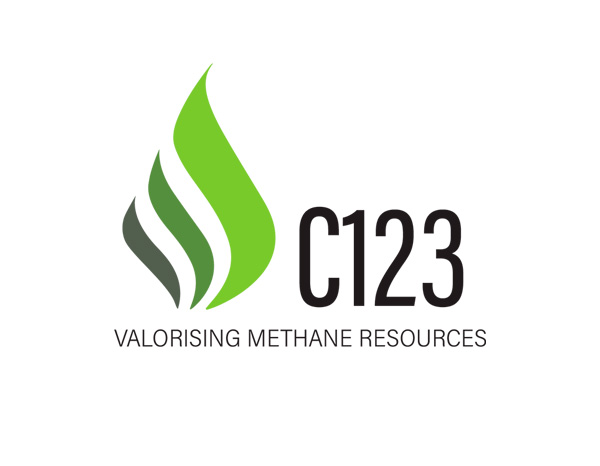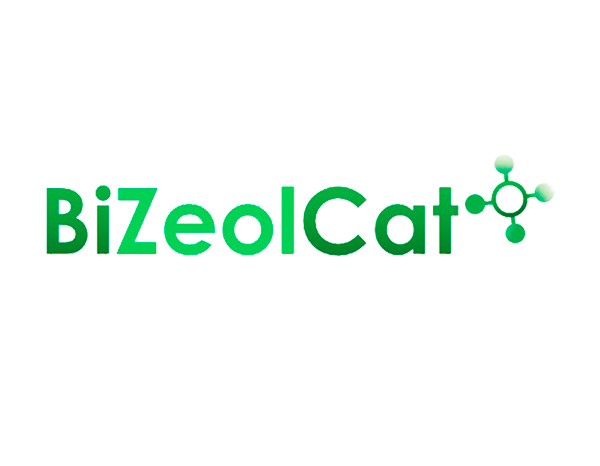Final Event
On March 16, 2023, the final ZEOCAT-3D event entitled "Advances for Catalysis in Hydrocarbons" was held at the Airotel Stratos Vassilikos Hotel in Athens, Greece, and also streamed online.
The main achievements and technical insights of the ZEOCAT-3D, BIZEOLCAT, and C123 research projects were presented according to the agenda.
All projects were funded under the topic CE-NMBP-24-2018 "Catalytic transformation of hydrocarbons".
The main concepts covered were:
- Core technologies innovation
- Catalysts and reactor performance
- Feedstock upgrading, technology assessment impacts, and upscaling
A total of 14 speakers participated in the event, and all of their presentations, including downloadable PDFs and YouTube recordings, are provided below for your convenience.
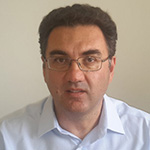
Fotis Katsaros
Novel zeolites for methane conversion to aromatics (DMA)
Project: ZEOCAT-3D
This presentation briefs one of the latest researches on catalyst synthesis with a focus on core/shell zeolites. We share an in-depth look into the catalyst structure, designed to optimize efficiency and selectivity for various chemical processes in various applications.
Organization: NCSR/DEMOKRITOS, Greece
Pdf: coming soon
Youtube: coming soon
Dr. Fotis Katsaros (Ph.D. Chemist) is the Research Director in the “Materials and Membranes for Environmental Separations” Laboratory of the Institute of Nanoscience and Nanotechnology / Demokritos. His current research interests focus on the: (i) Synthesis and characterization of nanoporous materials, (ii) Design and development of nanoparticles, and (iii) Preparation of adsorbents, catalysts/photocatalysts, and nanofillers for environmental applications, energy storage, and conversion.
He is a co-author in 75 publications in peer-reviewed journals (>3400 citations, h-Index: 29), in 4 book chapters, and of 4 patents. He is now co-editing the Special Issue “Environmental Remediation via Metal-oxides-mediated Heterogeneous Photocatalysis” in Catalysts (MDPI).
During his 20 years of research, he has been involved in about 15 European and National research projects. Dr. F. Katsaros was the coordinator of the NEXT-GEN-CAT project (FP7-NMP-2011-SMALL-5) for the development of novel PGM-free auto-catalysts. He was also the scientific coordinator of the PARTIAL-PGMs project (H2020-NMP-2014-2015). He is an evaluator of scientific projects (EU, Greece, Cyprus) and a member of the editorial board of Materials (MDPI), Catalytic Materials Section.

Richard Heyn
Dr. Richard H. Heyn earned his Ph.D. in organometallic chemistry from the University of California, San Diego, in 1992. Since 1998, he has been working at SINTEF, where he focuses on homogeneous catalysis for carbon dioxide utilization and sustainable chemistry.
Dr. Heyn has been involved in the European Public-Private Partnership SPIRE/Processes4Planet since its establishment in 2013. He currently holds the Advisory and Programming Group Vice-Chair position for Circularity Innovation.
In addition to C123, Richard coordinates two other Horizon Europe projects, ēQATOR on electrically-heated catalytic reactors and HYPER, on modular, electrochemical production of hydrogen peroxide.

Ludovic Pinard
From dehydroaromatisation reaction, to a tandem catalysis process for the production and regeneration for a liquid organic hydrogen carrier
Project: ZEOCAT-3D
This demonstration analyses 3D printing as an innovative strategy to improve catalytic performance in the methane dehydroaromatization process. It offers a broad overview of the results obtained from pilot-scale testing.
Organization: CNRS, France
After completing his Ph.D. on catalytic removal of volatile organic compounds at the University of Poitiers, he joined the group of J. Barrault in 2003 as an Associate Professor, where he focused on catalysis by oxides and coupling non-thermal-plasma with catalysis to remove VOCs. Later, he shifted his research to the synthesis of alternative fuels, catalyst deactivation, and regeneration, and catalytic evaluation of zeolites for refining and petrochemical applications.
He spent a year as a Visiting Professor at Sherbrooke University to develop skills in the energetic valorization of biomass. In 2021, he was awarded a Chair of Excellence by the Normandy Region, and in 2022, he became a full professor at the Ecole Nationale Supérieure de Chimie de Caen.
He coordinates the ANR PYCASSO project on biomass pyrolysis fundamentals and is involved in various industrial and European projects. He has published 100 international papers, 6 patents, and 4 book chapters and has given over 120 oral communications at national and international congresses. His current research focuses on designing and shaping materials on various porous length scales and their application as heterogeneous catalysts.
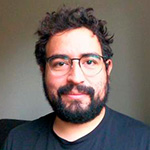
Alejandro Romero Limones
Catalysts and processes for the conversion of methane to CO and ethene
Project: C123
Through this discussion we give an insight into methane valorization and oxidative dehydrogenation of ethane. The study utilizes kinetics, transport phenomena, reactor modeling, and process simulation techniques.
Organization: Gent University, Belgium
Dr. Alejandro Romero Limones is currently pursuing a joint Ph.D. in the Laboratory for Chemical Technology at Ghent University (Belgium), and the Laboratory of Catalytic Reactor Engineering Applied to Chemical and Biological Systems at the Metropolitan Autonomous University – Iztapalapa (Mexico).
His Ph.D. research is already published and focuses on characterizing fluid dynamics and heat transfer mechanisms in packed beds with low tube-to-particle diameter ratios. He is also working on developing a kinetics model for the Oxidative Coupling of Methane (OCM) to simulate the process in the C123 project.
Alejandro's research is primarily focused on ethylene production through methane valorization and oxidative dehydrogenation of ethane. He is working on developing kinetics, transport phenomena, reactor models, and process simulation for these processes.
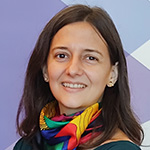
Isabel Vicente Valverde
Sustainable olefins and aromatics by innovative nanocatalysts
Project: BIZEOLCAT
This presentation focuses on the synthesis, characterization, and catalytic performance of novel nanocatalysts designed for the Bizeolcat project. It explores the unique properties of these nanocatalysts and their potential for revolutionizing catalytic processes.
Organization: EURECAT, Spain
Dr. Isabel Vicente Valverde has earned her Ph.D. in Chemistry and a Health and Safety MSc, receiving an Award for Outstanding Ph.D. Thesis from URV in 2011.
From 2011 to 2018, she gained experience in R&D execution and management worldwide, developing advanced functional materials tailored to specific applications.
Currently, she holds a permanent R&D position at UTQ-EURECAT Technology Centre and has expertise in designing, planning, and executing public and private R&D projects. Her specific areas of expertise include materials science (nano-materials), designing and developing more efficient catalytic systems, and implementing greener and more sustainable approaches to the production of add-value chemicals. She has co-authored two patents, 12 articles, and one book chapter and has given 16 communications at national and international conferences.

Alvaro Amieiro Fonseca
Ethylene Hydroformylation Catalysis
Project: C123
The main focus of this study is on developing catalysts for gas phase hydroformylation of ethene. We discuss the efforts made to comprehend the reaction mechanism and establish accurate models and possibilities of this exciting process.
Organization: Johnson Matthey, UK
Dr. Alvaro Amieiro Fonseca is a principal scientist at Johnson Matthey, UK, and coordinates the hydroformylation work package in the EU project C123. He received his chemistry degree from the UPV-EHU Basque Country University in Spain and a Ph.D. in catalysis from the University of Manchester in the UK.
With over 20 years of experience in industrial catalysis and advanced materials research, he has been supporting low-carbon technologies and sustainable innovation for Johnson Matthey. His research areas include hydrogen production and storage technologies for fuel cell applications, natural gas purification, carbon capture, and indoor air quality control. His applied technology fields include advanced sorbents and catalysts, syngas technology, metal and complex hydrides, and surface-functionalized materials.
Dr. Amieiro has established a network of research collaborators in academic and industrial circles, and secured over £2.5 million in research grants as a leading investigator. He has coordinated several successful technology demonstrators up to TRL 4-5 in the past years.
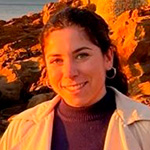
Carmen Garijo
Design and production of very specific nanocatalysts by FSP technology
Project: ZEOCAT-3D
With a particular focus on Zeocat nanomaterials, this presentation covers the FSP technology, including examples of catalysts that can be produced. The presentation includes the physicochemical characteristics of nanocatalysts, explores new ways to incorporate these nanomaterials into monoliths/reactors, and shows catalytic results firsthand.
Organization: LUREDERRA, Spain
Carmen Garijo holds a chemistry degree from the University of La Rioja, Spain. She is currently a researcher in the nanotechnology department at Lurederra, where she focuses on developing functional materials and optimizing the FSP synthesis technology for specific nanoparticles.
Her experience also includes working as a technical expert in various national and international collaborative projects, particularly in the industrial applications of nanomaterials. Her expertise in designing, synthesizing, incorporating, and characterizing materials using different techniques is noteworthy.
She has been actively involved in various projects, including European initiatives such as MARKETPLACE and H2020-NMBP-ST-IND-2018-814548 "ZEOCAT-3D."
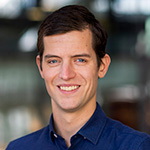
Leon R.S. Rosseau
Catalyst 3D printing for intensified chemical reactors, the heat transfer – pressure drop trade-off
Project: ZEOCAT-3D
In this study, we assess the topic of 3D-printed log pile structures and their geometry. The discussion includes the trade-off between pressure drop and heat transfer and explores the implications for reaction performance. All results are presented in ZEOCAT-3D (methane dehydroaromatization) and other similar reaction systems.
Organization: Eindhoven University of Technology, Netherlands
Leon Rosseau is currently a Ph.D. candidate in the Chemical Process Intensification group at the Chemical Engineering and Chemistry Department of the Eindhoven University of Technology. He obtained his BSc. and MSc. degrees cum laude in the same department, sponsored by the Topsector Chemistry scholarship hosted by Dow Chemical. His MSc thesis on dense inorganic membranes for hydrogen separation led to one publication in MDPI Membranes and was awarded the yearly Unilever Research Prize.
During his Ph.D., Leon Rosseau has been working on 3D-printed catalysts for chemical process intensification. He focuses on optimal designs for chemical reactors, balancing heat transfer, pressure drops, and chemical reaction performance. His work has resulted in two articles in scientific journals and contributions to various conferences. The Ph.D. is performed in the ZEOCAT-3D Horizon 2020 project context, where Leon collaborates closely with partners such as VITO and 3D-cat.
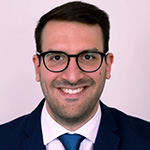
Riccardo Togni
Dr. Riccardo Togni gained his Ph.D. in Computational Fluid Dynamics from the University of Bologna (Italy) He has been working at DCS Computing as Senior Project Manager and Consultant since 2018.
His expertise lies in CFD and DEM modeling, granular flows, and reduced-order models.
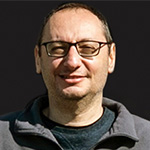
Grigoris Pantoleontos
Grigoris Pantoleontos is a Chemical Engineer with an MBA and currently works at the Center of Research and Technology (CERTH) in Thessaloniki, Greece.
His research focuses on membrane technology, including carbon capture using gas-liquid membrane contactors and hydrogen separation using ceramic membranes. He also specializes in strategic planning and optimization of technologies through equation-based modeling, techno-economic analysis, and CO2 transportation networks.
His publications cover 20 articles in scientific journals and book chapters.
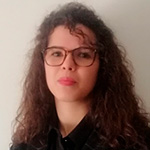
Vittoria Cosentino
Techno-economic assessment of Bizeolcat new propane and butane dehydrogenation and propane aromatization
Project: BIZEOLCAT
We share a techno-economic analysis that the Bizeolcat project has developed for new technologies. We focus on propane and butane dehydrogenation, as well as propane aromatization, and present production costs of the top products. In addition, these new technologies are compared with relevant benchmarks.
Organization: NEXTCHEM, Italy
Vittoria Cosentino is a chemical engineer who graduated cum laude from the University of Salerno in 2018 with a thesis on "Hydrogen Production from Bioethanol through auto thermal reforming with membrane reactor".
Currently, she works as a Strategic R&D Engineer at NextChem S.p.A. in Rome, Italy, after having worked at KT - Kinetics Technology S.p.A. in the same city as an Applied R&D Engineer from 2018 to 2022.
Vittoria Consentino is actively involved in executing EU-funded projects related to the decarbonization and innovation of hydrocarbon processes as well as hydrogen production.

Mohamed Mahmoud

Jordy Motte
Jordy Motte is a Ph.D. candidate who studied bioscience engineering at the University of Ghent and is set to complete his research next month. His focus is on the sustainability of alternative production pathways for C3 chemicals such as propylene and 1-propanol. He performs life cycle assessments and exergy analyses for the C123 project and has already published three papers on its results.
Dr. Mohamed Mahmoud earned his Engineering Doctorate (EngD) in process design from the Eindhoven University of Technology.
His work on reactor design, reaction kinetics, and catalysis in collaboration with SABIC Innovation and Technology Center in the Netherlands led him to earn his degree. Prior to that, he worked at ADNOC Research and Innovation Center in the UAE, developing separation technologies for carbon capture, hydrogen recovery, and hydrogen sulfide separation. As a process design and development consultant at the Process Design Center (PDC), he supports partners worldwide with process designs, concept development, and techno-economic assessments.
He leads projects on various topics, including biochemicals, energy efficiency, biofuels, hydrogen, CCUS, waste treatment, and recycling. He is currently working on multiple collaborative R&D projects, including C123, where he is responsible for conceptual design and techno-economic analysis of modular-scale processes.
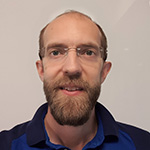
Trond Halvorsen
Expected socio-economic impacts of the Bizeolcat project on European Neighbourhood Policy countries
Project: BIZEOLCAT
We unveil a study that specifically examines the job creation and economic value that can be added by investing in and operating plants that use technologies from the Bizeolcat project.
Organization: SINTEF, Norway
Dr. Trond Halvorsen is a research scientist who focuses on impact assessments in innovation processes. He obtained his Ph.D. degree in economics from the Norwegian School of Economics (NHH) in 2013 after being inspired by an internship at the central bank of Norway. Since then, he has worked on applied research in SINTEF, ranging from the sharing economy to assistive living technologies and additive manufacturing.
Halvorsen is a member of several organizations, including the Norwegian Evaluation Association, the American Economic Association, and the national Cluster for Co-creative Service Design and Innovation in healthcare. He received several accolades, including the best paper award during the 7th International Conference on New Business Models in Rome in 2022.
In the BIZEOLCAT project, he acted as the WP coordinator for WP5 Sustainability, safety, and social assessment, conducting socio-economic impact assessments.
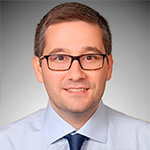
Cem Açıksarı
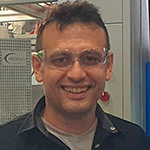
Serdar Çelebi
Scaling innovative Bizeolcat catalysts and reaction tests to reach TRL 5
Project: BIZEOLCAT
In this speech, we provide insights on how the catalysts developed in the Bizeolcat research project were adapted to the pilot scale. We present the results obtained and compare them to the ones obtained at laboratory scale.
Organization: TÜPRAS, Turkey
Dr. Serdar Çelebi holds BSc in Chemical Engineering from Middle East Technical University in Ankara-Türkiye. He completed his MSc in Material Science and Engineering from Koç University in İstanbul-Türkiye. He was awarded a Ph.D. degree by Eindhoven University of Technology (Eindhoven-The Netherlands) for a thesis on PEM fuel cells in 2012.
His main research areas are reaction engineering, hydrocarbon fuels/solvents, material synthesis, and electrochemistry. Dr. Serdar Çelebi has worked for over 11 years in Turkish Petroleum Refineries Corporation (TÜPRAŞ) and led an experimental research team of 10 researchers.
He has been involved in national and international projects at different TRL levels. He has 13 research articles in SCI journals and 8 patents.
Dr. Cem Aciksari holds BSc, MSc, and Ph.D. in Material Science and Engineering from Eskisehir Technical University in Turkey.
He specializes in synthesizing size and shape-controlled nanoparticles, shaping and scaling up heterogeneous catalysts, porous ceramics, and characterization of advanced oxide-based ceramics. He has over 10 years of experience developing novel and innovative materials for different TRLs, from laboratory to pilot production. For the last six years, he has been working as the technical lead of the Materials Division at TUPRAS R&D Center.
His publications include 7 research articles in SCI journals, and applied for 2 patents. He has participated in conducting 10 international and nationally funded projects, from his role as a researcher to project coordinator.
